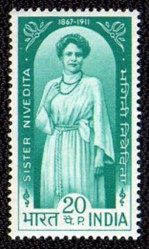Talk:Sister Nivedita: Ideal Student of an Ideal Guru
By Vishal Agarwal
Swāmī Vivekānanda inspired many young men and women worldwide to dedicate their lives to Hindu dharm. Among them was Margaret Elizabeth Noble, born in Ireland in 1867. Moving to England as a teenager, she supported her family by working as a teacher. Hearing Swāmī Vivekānanda’s discourses on Vedānta in London, she was deeply moved. In her heart she resolved that India was her true motherland and Hindu dharm her religion.
She wrote to Swāmī Vivekānanda asking to follow him to India as a disciple. He initially discouraged her, warning of the poverty, climate, and hardships of India under British rule. But she persisted. Finally, he accepted her and initiated her into brahmacarya, giving her the name Sister Niveditā – meaning “the dedicated one.”
Choosing to live in a poor neighborhood of Kolkātā, Niveditā immersed herself fully into Hindu culture and selfless service. When bubonic plague struck in 1899, she personally began cleaning streets, drains, and garbage heaps with her own hands. Seeing her example, local youth felt ashamed and soon joined in. She used even her food money to buy medicines for plague victims, disinfected huts, and whitewashed slums, never avoiding dangerous or dirty work.
Again, during the famine of 1906 in Bengal, she organized relief, distributing food and carrying supplies to famine-stricken areas.
Niveditā also worked to make Hindu dharm comprehensible to Westerners through her writings, championed women’s education, and promoted indigenous Bengali art at a time when elites were abandoning it for Western models. In Kolkātā, she founded what is today known as Sister Niveditā’s Girls’ High School.
After Swāmī Vivekānanda’s passing in 1902, she came to believe that India’s regeneration required political freedom. She traveled widely across the subcontinent, strengthening nationalist movements. Great leaders such as Subramaṇia Bhārati and Rasbehārī Bose acknowledged her as their Guru for inspiring their fight for India’s independence.
Despite her immense work, she never sought publicity. She gave herself wholly to Mother India and to Hindu dharm. She passed away in Darjeeling in 1911 at the young age of 44. At her cremation site, a memorial was inscribed: *“Here reposes Sister Nivedita, who gave her all to India.”*
Many Hindus, moved by her sacrifice and love, saw in her an avatāra of Reṇukā, mother of Bhagavān Paraśurāma. The Government of India has also issued a postal stamp in her honor.



